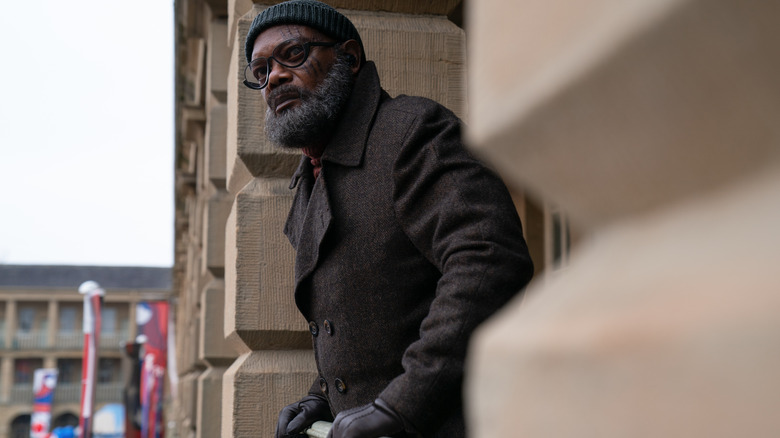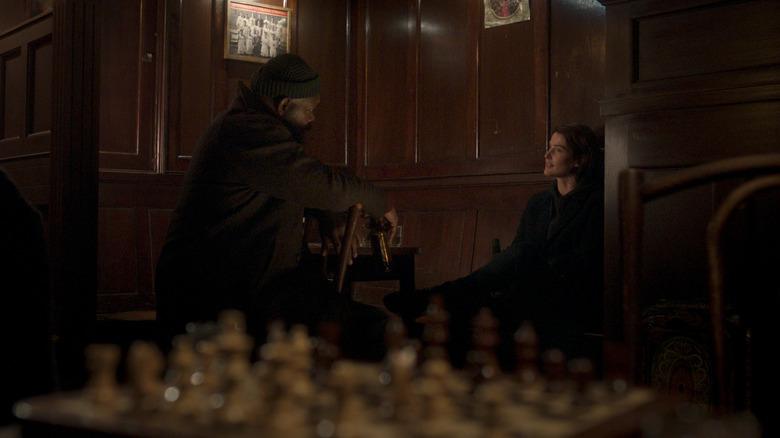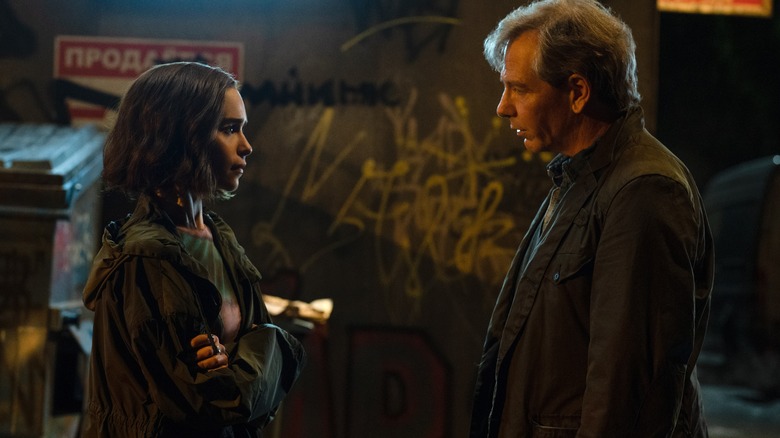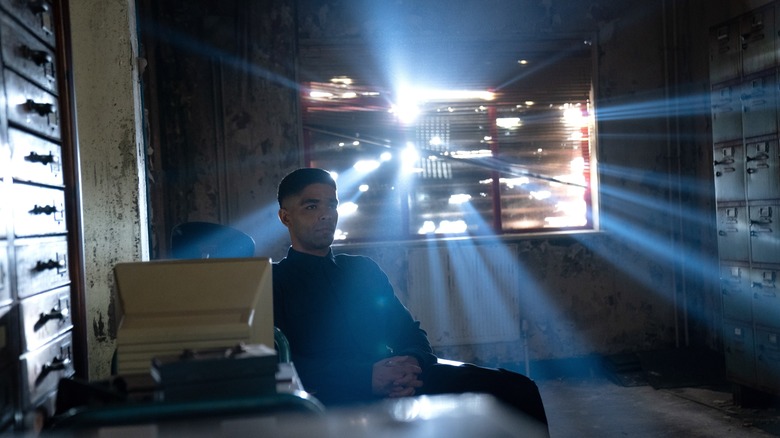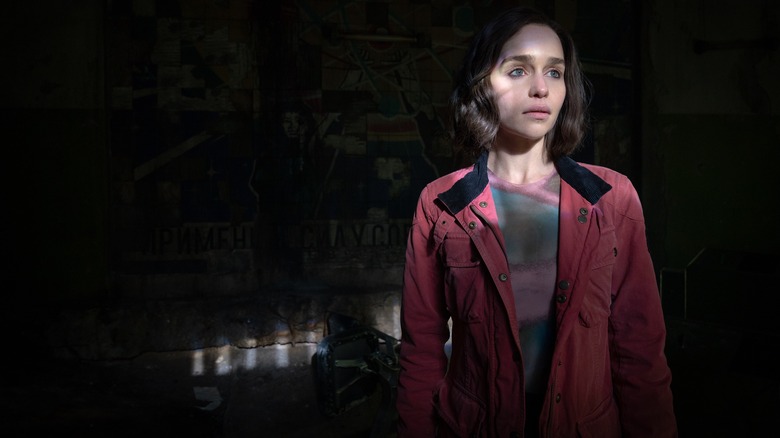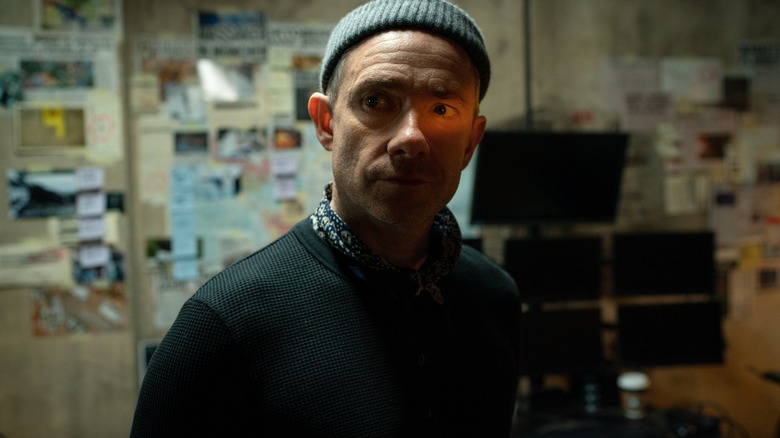Secret Invasion Episode 1: Marvel's Espionage Series Goes Undercover With Mixed Results
How many times have we heard folks like Marvel president Kevin Feige toe the company line, stating that the secret to the franchise's enduring success has been its ability to switch genres as necessary to keep audiences on their toes and never be sure of what to expect next? (Hmm, that doesn't sound too different from those shapeshifting Skrulls, does it?) Well, it's now the responsibility of the latest Disney+ series "Secret Invasion" to forge a new identity, going further than previous entries such as "Captain America: The Winter Soldier" or "Black Widow" ever could and become Marvel's first real espionage series.
Comic book fans will need no introduction to one of the most thrilling and epic-sized crossovers in (relatively) recent Marvel history, published in 2008 and spearheaded by acclaimed writer Brian Michael Bendis, which documented the long-simmering scheme by the extraterrestrial race of Skrulls to replace several significant Marvel superheroes with their own imposters in an attempt to take control of Earth.
The "Secret Invasion" premiere, directed by Ali Serim from a script credited to Kyle Bradstreet and Brian Tucker, provides both reason to hope and reason to be skeptical that this show will be able to live up to such lofty standards. Yes, it's obvious that those in charge rightfully recognized the storytelling potential of the Marvel Comics' storyline ... but, no, there's no escaping the optics that this still wasn't deemed enough of an event to merit a feature film of its own. That nagging feeling leaves the miniseries in an odd place, fighting to justify its own existence as a severely stripped-down adaptation that can't help but feel like it's been shunted off to the filler-heavy doldrums of streaming — though it's nonetheless tasked with telling a sweeping, conspiracy-laden tale.
Yet, in a neat (and probably unintentional) parallel, that need to prove itself all over again is exactly what ends up driving our shadowy hero, too, as Samuel L. Jackson's Nicholas J. Fury is finally given the time and space to step into a leading role in the Marvel Cinematic Universe.
Worse for wear
Not every Marvel project kicks things off with a terse and paranoia-laced conversation, an attempted strangulation once suspicions are confirmed, and a gunshot to the heart after a brief and rather undignified tussle — all leading to a pre-opening credits reveal confirming that, truly, nothing is at it seems. But after the opening sequence, which was released ahead of the show's debut and drives home the idea that nobody (not even Martin Freeman's former CIA agent Everett Ross, since replaced by a Skrull impersonator) can be trusted, we're soon left to follow a flawed protagonist who may or may not be up to the task.
Agent Maria Hill's (Cobie Smulders) shocking discovery that Skrulls have managed to infiltrate even the highest levels of human counterintelligence forces her and returning Skrull good guy Talos (Ben Mendelsohn) to make the call that's been long overdue. Nick Fury, last seen living it up in Earth orbit on the space station S.A.B.E.R., returns to the planet after years in space with a fun little intro, riffing on old-school alien invasion movies like "The Day the Earth Stood Still." Shot from a distance and just out-of-focus enough to resemble classic extraterrestrial depictions, the silhouette soon resolves into that of Fury. In truth, it takes no time at all to realize that Fury is nothing like the relentless S.H.I.E.L.D. director of old. He now walks with a noticeable limp, lacks his distinctive eye patch, his once-honed spy skills may be failing him, and he must constantly fend off accusations from colleagues and enemies alike that he's been out of the game too long and too haunted by Thanos' infamous Snap Heard 'Round The World to be of much use anymore.
But meaningful self-reflection is a luxury neither the character nor the premiere can apparently afford, unfortunately. Other than trading some barbs with old spy friend and current MI6 boss Sonya Falsworth (Olivia Colman, having the time of her life) and a brief (but much-welcomed) conversation with Agent Hill over a game of chess, this entire character thread is downplayed in favor of the imminent threat of a dirty bomb attack. This puts Fury, Talos, and Hill on the hunt for Kingsley Ben-Adir's Gravik — a Skrull with a particularly sharp chip on his shoulder.
Too many secrets?
In order to talk about Gravik, we have to pause and note just how much "Secret Invasion" throws us into the deep end without any actual foundation. Not only do we start in media res with the initial fight and chase sequence involving Ross' Skrull imposter (which is a fine choice in the micro and works well enough in a vacuum), but we don't even get the benefit of a "Previously on the MCU" info-dump to remind viewers of extremely crucial information.
A lot has happened since Skrulls were first introduced in 2018's "Captain Marvel" as misunderstood refugees searching for a home, which this first episode sort of waters down by repackaging it into a brewing schism between different factions of Skrulls — one represented by Talos, prioritizing coexistence with humanity and nonviolence (Fury himself chides Talos at one point about his weakness for mercy), and one led by Gravik, driven by anger at their current circumstances ... which they blame on Fury (and, implicitly, Brie Larson's Carol Danvers) for abandoning them to their current plight and breaking their promise.
What promise was that, exactly? Well, that's part of the problem — we don't really know. There are obviously some unresolved past dealings between Fury and Gravik (and, by extension, Talos and the rest of the Skrulls) and a festering grievance that Fury must make amends for. But intentionally withholding this information from us does the show absolutely no favors for our investment in this conflict.
Our first scene between Fury and Talos breezes through loads of exposition and crucial character dynamics that probably would've been better off shown rather than offhandedly told: the apparent death of Talos' wife Soren (Sharon Blynn), the disappearance and presumed defection of his daughter G'iah (Emilia Clarke, a compelling enough performance even if she's not given much to work with just yet), Gravik's strained personal history with Fury, and even the reasons behind why Fury left Earth for so long. "You going to tell me why you abandoned Earth?," Hill thankfully asks in a rare moment for someone to actually clarify their motivations. Frustratingly, as much as Marvel so often relies on characters simply outright stating their feelings out loud, Fury only alludes to this as a "crisis of faith" without any other real explanation and is just as quick to handwave away why he came back. Tune in next time on "Secret Invasion" for some basic character beats, I suppose!
As much as we'd love to care about this complex web of interweaving conflicts, the premiere takes its secretive nature just a little too far and frequently holds viewers at arm's length.
Gravik and G'iah
Who among us could blame an entire population of wayward Skrulls for falling under the sway of a hardened leader with as much charisma as Gravik? Played by "One Night in Miami" star Kingsley Ben-Adir, the incredibly talented performer takes the barest bones of a figure lacking in anything tangible to really hold onto in this episode — one can argue that it's still early enough to learn more about our central characters but, I mean, it's also the job of a series premiere to properly establish its main players and their motivations — and instantly imbues the character with a lived-in sense of weariness and unquenchable resolve. That's a tall task for a primary antagonist who isn't even introduced until more than halfway through the episode, but one that Ben-Adir is clearly prepared to handle moving forward.
Yet, for all of Gravik's narrative importance, our window into the perspective of the Skrull rebellion comes mainly through G'iah. After welcoming newcomer Beto (Samuel Adewunmi) to an abandoned nuclear plant south of Moscow, an idyllic community of displaced Skrulls that she dubs "New Skrullos," G'iah seems like the perfect vessel to humanize (er, Skrullenize?) their mission to recolonize Earth. As disappointing as it is to see such a potent immigrant metaphor from "Captain Marvel" repurposed to a storyline that perpetuates the fear of some sinister "other," it's certainly possible that "Secret Invasion" could turn the tables again and depict the plight of Skrulls in a favorable light. That is, until G'iah slips into a cordoned-off section of the facility and we get to see exactly what disturbing lengths these Skrulls go to assume their human "shells" and gather and acquire their valuable intel. It can't help but feel like the same old problem from "The Falcon and the Winter Soldier," which neatly sidestepped the nuanced idea that Marvel villains can have perfectly valid and justifiable complaints ... if only it weren't for their pesky penchant for all that murder and torture.
Some days, you just can't get rid of a bomb ... or find them
Still, "Secret Invasion" presents a simple enough premise for us to gather that Gravik is hellbent on furthering the Skrull cause by instigating war between America and Russia and must be stopped.
Here, at least, the episode explores the internal struggle that we can actually sense G'iah going through. Informed of her mother's death and caught between her divided allegiances to her cause and her father Talos, the Skrull finally makes an active choice about whose side she's on. Having previously rebuffed Talos' attempts to get her to hand over the three bombs she surreptitiously picked up earlier in the episode, she spills the details on Gravik's plot to activate the weapons of mass destruction in one of the MCU's worst terrorist attacks yet. Every major character converges on this one Russian locale, splitting up Fury, Talos, and Hill as they follow different Skrull couriers through packed crowds. Of course, their empty bags turn out to be a series of decoys, allowing Gravik to gain the upper hand with some shapeshifting mind games on Fury (first appearing as the same little girl who Fury came across earlier in the hour before his meeting with Sonya, hinting that Gravik has been keeping tabs on his old friend Fury for quite some time) and promptly kill hundreds of innocents.
We have to give the episode this much credit, at least: ending on Maria Hill's shocking death (presuming this actually sticks, of course) is quite a way to conclude the premiere and establish Gravik as a formidable villain. Like all worthwhile spy stories, the harrowing plot developments in the last few minutes of the episode prove the writers understand that the good guys can't always win in this genre. It will take some serious improvements and consistency in the episodes ahead to quash any and all concerns that this series has what it takes to succeed where previous Disney+ shows have struggled. But there's reason to believe that, like Nick Fury himself, "Secret Invasion" still has enough left in the tank.
Stray thoughts
- Understatement of the Century: "Imagine a world where information can't be trusted," the conspiracy-minded Agent Prescod (Richard Dormer) tells Skrull-Ross in a foreboding line early on in the hour. Ooooh, scary! As much as the MCU feels like a downright terrible place to live for ordinary citizens, even a Skrull invasion throwing humanity's ability to decipher truth amid chaos pales in comparison to, uh, everything going on our own Earth with recent current events going back, I don't know, the better part of this last decade.
- Going Green: You've got to love the attention to detail in the opening credits sequence, featuring what looks like hand-drawn animation depicting the Skrulls taking over the entire planet with evocative and sickly green colors. More of this, please!
- Chain of Command: Anyone else slightly confused by the initial characterization of G'iah? She first appears to that newcomer Skrull Beto, taking him under her wing and on a tour of New Skrullos as if she were someone of high ranking. But she immediately gets knocked down several pegs as a sort of glorified messenger by both Gravik and his henchman. It'd actually be an interesting dynamic to have her remain a low-ranking Skrull with nothing notable about her other than her relation to Talos (which I'm also not sure is meant to be a secret among Gravik and his Skrulls or not?), but it did make me go, "Wait, what?" for a moment when I realized all her missions in this episode basically amount to grunt work.
- Americans Against Russia: Okay, come on now. Superhero naming conventions are typically silly, making this just one link in a long, proud chain of traditions for this kind of media. But using a splinter group of radicals that's hilariously called "Americans Against Russia" (oh, Marvel, you're not beating the accusations that political commentary just ain't your forte) is something that I simply cannot allow to go by unobserved.
- The One Where Ross Turns Into A Skrull: The early twist involving Ross sure raises all sorts of questions. Has he been a Skrull all along? Is the actual Ross stuck somewhere in New Skrullos, trapped in that gnarly mind-invading torture device? And, uh, why don't Hill or Fury seem all that concerned about him or ever mention him again?
- Dying on the Hill: Again, assuming that Maria Hill getting shot by Gravik impersonating Fury is really the end for the character, let's commend Cobie Smulders and her agent for collecting a decade of Marvel paychecks despite never really being given much to do. Fans will surely lament the waste of potential inherent in her comic book counterpart, but I've always loved seeing Hill pop up as a sort of post-Agent Coulson connective tissue throughout the movies and shows. In any event, getting one final payday for a single episode of work in "Secret Invasion" is the kind of hustle I can appreciate.
